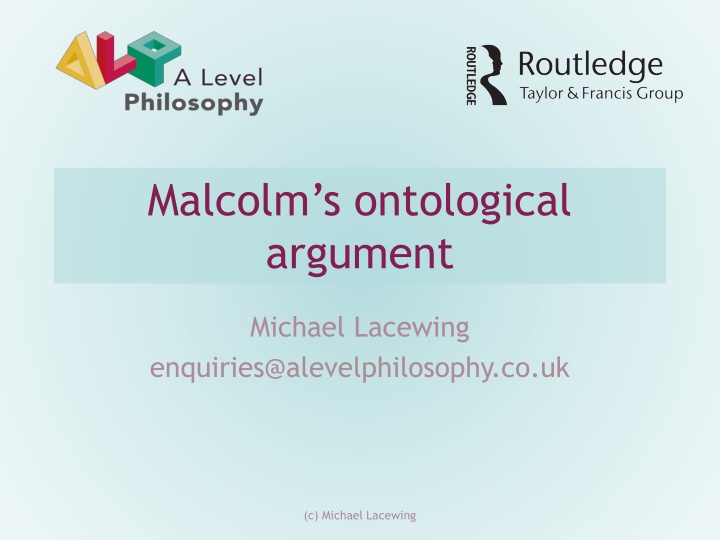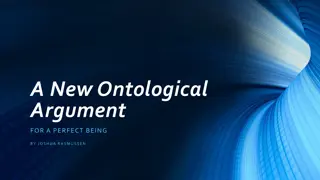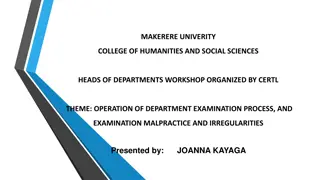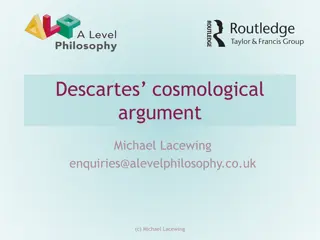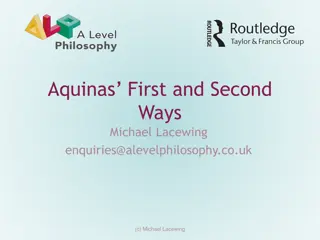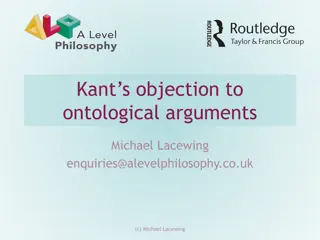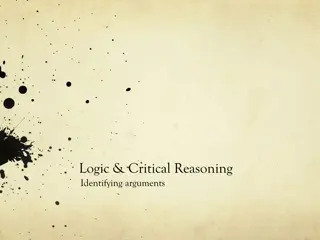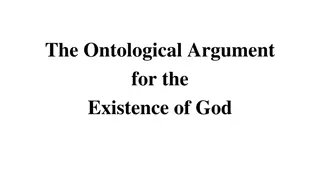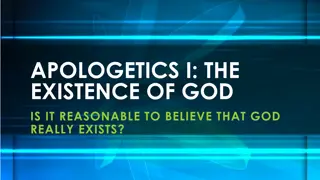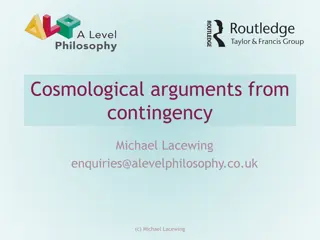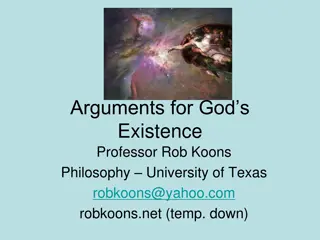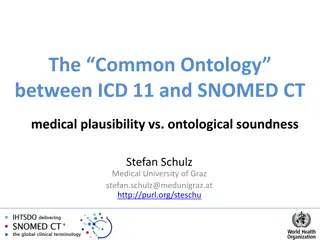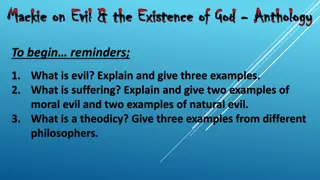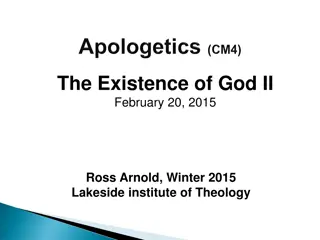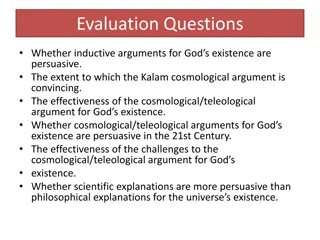An Examination of Ontological Arguments for God's Necessary Existence
Various ontological arguments, such as Malcolm's and Anselm's, propose that the existence of God is logically necessary, grounded in the concept of God as the greatest possible being. These arguments challenge the coherence of the concept of God and counter objections, like Kant's claim that existence cannot be inherent to the concept of God. By highlighting the necessity of God's existence and addressing logical coherence, these arguments offer philosophical insights into the nature of God.
Download Presentation

Please find below an Image/Link to download the presentation.
The content on the website is provided AS IS for your information and personal use only. It may not be sold, licensed, or shared on other websites without obtaining consent from the author.If you encounter any issues during the download, it is possible that the publisher has removed the file from their server.
You are allowed to download the files provided on this website for personal or commercial use, subject to the condition that they are used lawfully. All files are the property of their respective owners.
The content on the website is provided AS IS for your information and personal use only. It may not be sold, licensed, or shared on other websites without obtaining consent from the author.
E N D
Presentation Transcript
Malcolms ontological argument Michael Lacewing enquiries@alevelphilosophy.co.uk (c) Michael Lacewing
Necessary existence God is the greatest possible being is a logically necessary truth It is part of our concept of God A being that depends on something for its existence is not as great as one that doesn t. Therefore, God s existence cannot depend on anything. If God exists, then God s existence is necessary. (c) Michael Lacewing
Anselms second version of the argument Think of two almost identical beings, X and Y. X is a being which we can conceive not to exist Y s not existing is inconceivable Y is greater than X The greatest conceivable being is a being who, we conceive, must exist. This does not compare a being that exists with one that doesn t, but two types of existence necessary and contingent (c) Michael Lacewing
Malcolms argument Either God exists or God does not exist. God cannot come into existence or go out of existence. If God exists, God cannot cease to exist. Therefore, if God exists, God s existence is necessary. If God does not exist, God cannot come into existence. Therefore, if God does not exist, God s existence is impossible. Therefore, God s existence is either necessary or impossible. (c) Michael Lacewing
The argument God s existence is only impossible if the concept of God is self-contradictory. The concept of God is not self-contradictory. Therefore, God s existence is not impossible. Therefore, God exists necessarily. (c) Michael Lacewing
Is GOD a logically coherent concept? Is the concept of God logically incoherent? Are the attributes of God coherent? Does it make sense to suppose a being that exists necessarily, if it exists at all? (c) Michael Lacewing
Malcolm on Kants objection Kant famously objected that existence cannot be part of the concept of God. An analytic truth unpacks a concept. The predicate tells you something about the subject. To say x exists is not to describe x at all or explain what x is. Existence is not part of the concept of anything. Reply: This doesn t apply to necessary existence To say that God exists necessarily is to unpack the concept of God. (c) Michael Lacewing
Discussion Malcolm: If it is part of our concept that God exists necessarily, then we must accept that God exists necessarily is an analytic truth So it isn t possible that God doesn t exist Kant: no, the analytic truth is If God exists, then God exists necessarily This doesn t entail that God exists Malcolm: It does. If God exists necessarily, then God does not depending on anything, and has neither beginning nor end. So it is either necessarily true or necessarily false that God exists, and it is not necessarily false. (c) Michael Lacewing
Objection Obj: if God doesn t exist, then it is impossible for God to be brought into existence. But this impossibility isn t the same as it being impossible for God to exist. If God doesn t exist, it is this fact not the concept of God that makes God s existence impossible. Whether God s existence is possible depends upon whether God exists or not! (c) Michael Lacewing
Objection The correct conclusion of Malcolm s argument is If God doesn t exist, then God s existence is impossible; and if God does exist, then God exists necessarily . Not depending on anything characterises the nature of God s existence, if God exists. But existence doesn t characterise God. (c) Michael Lacewing
